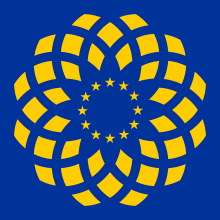Fusion for Energy

The European Joint Undertaking for ITER and the Development of Fusion Energy or Fusion for Energy (F4E) is an agency of the European Union (EU) created as a Joint Undertaking under the article 45 of the Euratom Treaty by the decision of the Council of the European Union on 27 March 2007.[1]
In conjunction with the six other Domestic Agencies in countries party to the ITER Agreement, F4E sources components, equipment and other materials to the ITER International Organization (IO) in accordance with specifications that ITER IO provides. F4E is also responsible for managing the EU's direct financial contribution to ITER. In addition, F4E is also responsible for managing the EU's involvement in the Broader Approach Agreement activities and activities in preparation for the construction of a demonstration fusion reactor (DEMO) and related facilities.[2]
Governance
Its headquarters are in Barcelona, in Spain. As a joint undertaking, its governing board is made up of the European Commission, representing Euratom, all the Member States of the European Union and Switzerland, which participates as a third country member.[3] As of January 2013, the director of the Fusion for Energy agency is Henrik Bindslev.
Management difficulties
A report by the consultancy Ernst & Young published in 2013 by the European Parliament's Budgetary Control Committee found that F4E has suffered from significant management difficulties. According to the report, "the organisation faced a series of internal problems that have only been gradually addressed, notably an organisational structure ill-adapted for project-oriented activities."[2] From 2010, a host of reforms were undertaken within F4E, including a reshuffling and reorientation of the governance and management structures, as well as a cost-savings programme.[2]
See also
- ITER
- Fusenet
References
- ↑ European Council (30 March 2007). "COUNCIL DECISION of 27 March 2007 establishing the European Joint Undertaking for ITER and the Development of Fusion Energy and conferring advantages upon it". Official Journal of the European Union L98: 50–72. Retrieved 30 June 2013.
- ↑ 2.0 2.1 2.2 "Potential for reorganisation within the ITER project to improve cost-effectiveness" (PDF). Budgetary Control Committee of the European Parliament. 27 May 2014. Retrieved 30 June 2013.
- ↑ "Switzerland officializes ITER participation". www.iter.org. 29 May 2009. Retrieved 1 May 2014.
External links
- Fusion for Energy, the agency's home page.
- Fusion for Energy: Understanding Fusion
- Euratom/fusion, the Fusion page of the EURATOM
| ||||||||||||||||||||||